10 Best Laptops For Law School Students In May 2024
If you're a law school student, you know that having a good laptop is essential. Not only do you need one for taking notes in class, but you'll also likely need it for doing research and writing papers.
With so many different laptops on the market, it can be tough to know which one is right for you. That's why we've put together this guide to the best laptops for law students.
We'll tell you what to look for when choosing the best laptop for law school students and give you some recommendations based on our testing. So read on to find out more.
Skip Ahead
10 Best Laptops for Law School Students In 2024
This list of the 10 best laptops for law school students in 2024 is a comprehensive review designed to cater to the highly specific needs of aspiring lawyers.
| IMAGE | PRODUCT | FEATURES | BUTTON |
|---|---|---|---|
Acer Swift 3 |
|
||
ASUS TUF Dash |
|
||
Dell Inspiron 7420 |
|
||
HP Pavilion 15 |
|
||
Dell Inspiron 16 |
|
||
ASUS ROG Strix G15 |
|
||
LG Gram |
|
||
ASUS ZenBook 14X |
|
||
Acer Aspire 5 |
|
||
Microsoft Surface Pro 9 |
|
From models boasting long battery life to those offering top-notch security features, we are here to help you find the right technological companion for your legal studies.
We walk you through each model's unique features, pros and cons, as well as the price ranges so that your investment is precisely targeted towards your academic success in 2024.
1. Acer Swift 3
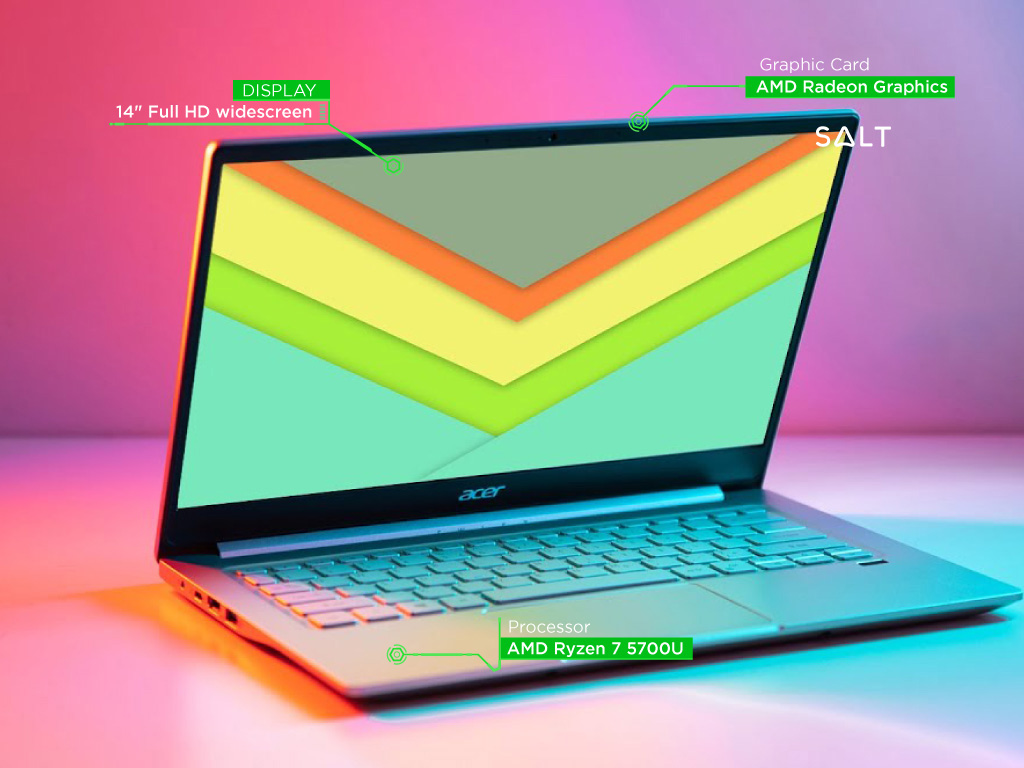
- Screen: 14'' FHD
- CPU: Ryzen 7 5700U
- Graphics: AMD Radeon
- RAM: 16GB DDR4
- Storage: 512GB SSD
- Ports: 1x USB 3.2 Type-C (DisplayPort and USB charging), 2x USB 3.2 Gen 1 (1 Power-off Charging), 1x HDMI 2.0 with HDCP support, 1x headphone/microphone-in jack
- Speaker: 2.1 stereo Speakers
- Weight: 2.62 Pounds
Believe me when I say I absolutely adore the Acer Swift 3. Climbing from the mid-tier range of laptops, Acer has slapped a reasonable price point of $677 on this beauty. From my experience, you'll get more than your money's worth.
To start with, the Swift 3 comes with a stunning 14'' FHD screen. Let me tell you, the content was an absolute delight on this one; it was as if I was watching movies in a mini theatre packed into a laptop.
Then there's the heart of any laptop- its processing power. With an impressive Ryzen 7 5700U, navigating through heavy software and multitasking was as seamless as cutting warm butter. This is advantageous for students like myself, who are always switching between multiple tabs and applications.
Next up is graphics handled by AMD Radeon GPU – fair warning, guys – it's not built for hardcore gaming, but it did manage casual gaming sessions with zero issues.
The system is loaded with 16GB DDR4 RAM & 512GB SSD storage, meaning things run smoothly while booting up or running multiple applications, and there’s ample room for files and software.
Now let's talk about an often-overlooked feature – the number of ports available; it packs in all essentials, including a flexible Type-C port supporting display and USB charging!
Speaking from my own experience, this laptop has excellent stereo speakers, quite satisfying for its class, but if you are an audiophile, headphones would be a better choice. , lastly, highlights the weight, which is just perfect at 2.62 Pounds, making it super convenient to carry around.
One hiccup that bothered me was the struggle with power cord fitting stability. It kept slipping out, which can be really frustrating, especially when you're in the middle of some important work.
My Verdict
To wrap it up, Acer Swift 3 undoubtedly has its quirks, yet it delivers a bang for the buck experience with its praiseworthy performance, handy size, and remarkable features.
It’s an excellent choice for students seeking a laptop that is capable of sailing them through their academic rigors and provides glare-free streaming.
Pros And Cons
- Eye-Catching Display
- Powerful multi-tasking
- Numerous Port Options
- Unstable Power Cord Fit
- Average Speaker Quality
2. ASUS TUF Dash

- Screen: 15.6" FHD
- CPU: Intel i7-12650H
- Graphics: NVIDIA RTX 3060
- RAM: 16 GB DDR5
- Storage: 512GB PCIe NVMe M.2 SSD
- Ports: 2x USB 3.2 Type-A (Gen1), 1x USB 3.2 Type-C, 1 x HDMI 2.0b, 1x Thunderbolt 4, 3.5mm
- Speaker: 2 x 4W Stereo
- Weight: 4.41 pounds
When I first laid my hands on the ASUS TUF Dash, or more precisely, when I unpacked it from its box, I could immediately sense its tangible robustness.
As part of the TUF series, this laptop upholds the lineage of durability and snug design while incorporating magnificent high-tech specs that unfailingly cater to hardcore gaming and intense streaming needs.
The ASUS TUF Dash has a 15.6” FHD screen - a compact space boasting a 144Hz refresh rate. Trust me, once you have relished the ultra-smooth gaming or streaming experience on this device, there's simply no going back.
Lesser motion blur and heightened responsiveness are indeed a competitive edge to be reckoned with.
Under its solid exterior hides an even more impressive internal architecture. It features an Intel Core i7-12650H CPU, NVIDIA RTX 3060 Graphics card, 16GB DDR5 RAM, and a spacious 512GB SSD.
This combination ensures that whatever game you throw at it gets tackled with absolute ease; not once did I experience any stuttering or lag during high-performance setup.
Weighing only 4.41 pounds and outfitted with multiple ports, including Thunderbolt 4, USB-C & A options, and HDMI port for external display, it enchants the user by affording extensive connectivity options.
It also comes with DOLBY ATMOS Stereo speakers, which makes your audiovisual experience immersive.
Building on its TUF heritage, this laptop is adept at handling rough usage without compromising performance over time – after all, longevity in tech gear is precious! Perhaps this sturdiness comes credited to the military-grade materials used in the design – hey, I am not complaining.
However, not everything is as rosy as one would hope for - a few quirks popped up during my usage. For example, the build quality, although sturdy, felt flimsy in parts, and the cooling fan gave a grinding noise after some continuous sessions of play - I didn't expect this.
And we haven't gotten to the software part - ASUS's Armoury Crate software is somewhat tricky to navigate.
My Verdict
Given my love for an immersive gaming experience, I couldn't help but fall for the lightning-fast ASUS TUF Dash 15 laptop. Its high-performance specs suited all my streaming needs to perfection.
Would I recommend it? If gaming or streaming is your top priority and if you can overlook minor hardware hitches, then this powerhouse might be right up your alley!
Still, the hardware-related hiccups were something that did leave room for improvement while working on it.
Pros And Cons
- Great performance
- Impressive 144Hz refresh rate
- Sturdy build
- Relatively weak under extensive usage
- Buggy system management software
3. Dell Inspiron 7420
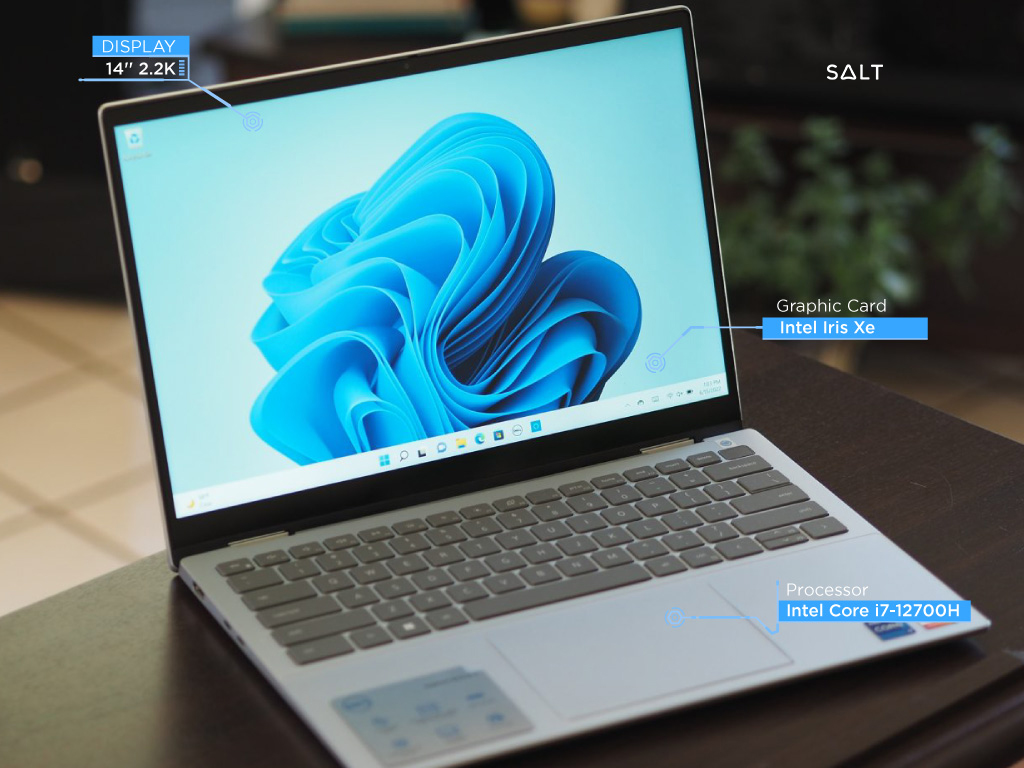
- Screen: 14" 2.2K
- CPU: Intel i7-12700H
- Graphics: Intel Iris Xe
- RAM: 16GB DDR5
- Storage: 1TB M.2 CL35 M.2 SSD
- Ports: 1 x Audio jack, 1 x Micro SD card reader, 2 x USB 3.2 Gen 1 Type-A,1 x Power jack, 1 x HDMI 2.0, 1 x Thunderbolt 4 (USB Type-C)
- Speaker: 2x2w Stereo
- Weight: 3.7 pounds
As a law student, the most vital tool in your arsenal is undoubtedly your laptop. The hustle and bustle of law school's constant deadlines require a durable, efficient, and reliable notebook.
One fascinating contender that's been making headway on my radar recently is Dell's Inspiron 7420.
For the price of $875, this laptop packs an impressive set of specifications, including a powerful Intel i7-12700H processor coupled with Intel Iris Xe graphics for all your multitasking needs.
A significant 16GB DDR5 RAM and 1TB M.2 CL35 M.2 SSD storage ensure all your data is stored securely and preferable apps run efficiently.
When it comes to the physical design, Dell has opted for a compact look with a sturdy frame supporting a gorgeous 14" 2.2K screen. Despite the size, the laptop only weighs approximately 3.7 pounds, making it incredibly handy for on-the-go use.
However, some users have argued that the body feels "plastic," noting its vulnerability to scratches given its softer chassis. Nonetheless, you can always use a protective casing to get around this issue if it bothers you.
When it comes to the connectivity options on this device, you get an audio jack and Micro SD card reader along with two USB 3.2 Gen 1 Type-A ports located on each side.
For display connectivity, there's an HDMI 2.0 port along with a Thunderbolt 4 (USB Type-C) port near the front, which can feel slightly awkward if you're using multiple peripheral devices at once- so be mindful of that!
The Inspiron also packs in sufficient sound quality with its built-in stereo speakers, although users have raised concerns regarding battery life, which seems somewhat underwhelming given demanding tasks.
My Verdict
In conclusion, while Dell’s Inspiron checks many boxes for fulfilling daily tasks effectively, it indeed comes with its share of cons that you should take into account before making a purchase.
Pros And Cons
- Excellent Price-Performance Ratio
- Smooth Performance with Large Programs
- Compact and Lightweight
- Feels "Plastic" and Prone to Scratches.
- Battery Life Could be Bette
4. HP Pavilion 15
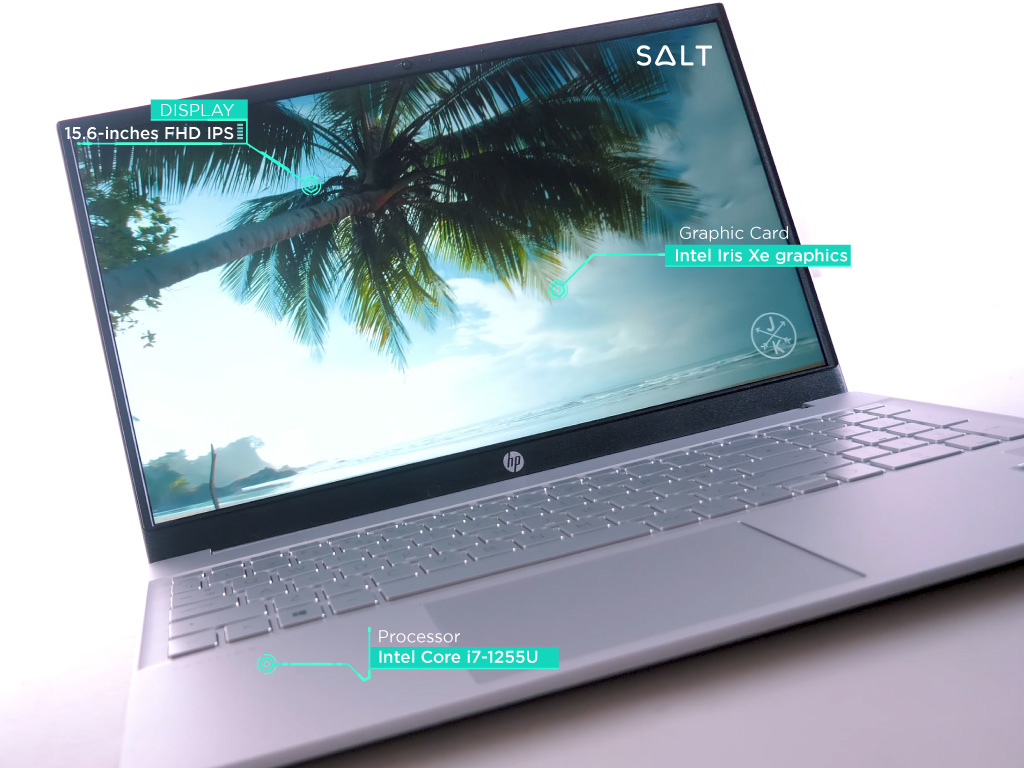
- Screen: 15.6'' FHD
- CPU: Intel i7-1255U
- Graphics: Intel Iris Xe
- RAM: 16GB DDR4
- Storage: 512GB SSD
- Ports: 2 x USB Type-A, 1 x HDMI 2.1, 1 x Kensington Lock, 1 x AC smart pin, 1 x USB Type-C, 1 x 3.5 mm Combo Audio
- Speaker: 2 x stereo speakers
- Weight: 3.86 pounds
I've had my fair share of experience with different laptops, and the HP Pavilion 15 caught my eye because it offers a decent balance between price and performance.
Priced at $734, the sleek silver laptop boasts a 15.6" FHD display powered by an Intel i7-1255U CPU and Intel Iris Xe graphics. With these specs, you won't encounter any issues executing a variety of tasks, whether it's research, word processing, or even light multitasking.
When I opened multiple tabs for that crucial legal paper deadline looming overnight or streamed some videos during my quick study breaks, this baby didn’t blink an eye. Kudos to its hefty 16GB DDR4 RAM and speedy 512GB SSD storage!
Staying organized as a law student necessitates a myriad of peripheral devices, such as external drives or presentation clickers.
But worry not! The HP Pavilion provides an abundance - two USB Type-A ports, one HDMI 2.1 port for high-res presentations, one Kensington Lock for security (especially in libraries), one AC smart pin (for docking stations), one USB Type-C for speedy data transfer, and charging duties, and a combo audio port for jamming out while cramming.
Music lovers will appreciate the stereo speakers – they aren't studio-quality, but they get surprisingly loud – perfect to create that study ambiance you can zone into.
Take it from me: hauling around a laptop all day isn't fun. That's why I appreciated the fact that it weighs barely under four pounds at approximately 3.86 pounds.
One more thing I loved about this laptop is the fingerprint scanner- pulling up my notes as quickly as possible wasn’t an issue anymore!
My screen once glitched out completely on me, a literal nightmare when you're in the middle of something important. Thankfully, a quick reboot seemed to fix the issue, and I haven't encountered it since.
The mouse pad froze on me once, and some might dislike the tiny lettering on the keys. A substantial drawback was intermittent connection issues, which slowed down web browsing significantly; it was a minor issue for me but can be a major dealbreaker for others.
Despite these concerns, in my opinion, this laptop is well worth its cost for the functionality it offers.
My Verdict
In short, if you need a high-performance laptop that's lightweight and wrapped up in an elegant silver façade without draining your bank account too much, then HP Pavilion 15 is certainly worth considering.
Pros And Cons
- Advanced specifications
- Lightweight design
- Numerous ports
- Fingerprint scanner
- Occasional screen glitches
- Potential internet connection issues
5. Dell Inspiron 16
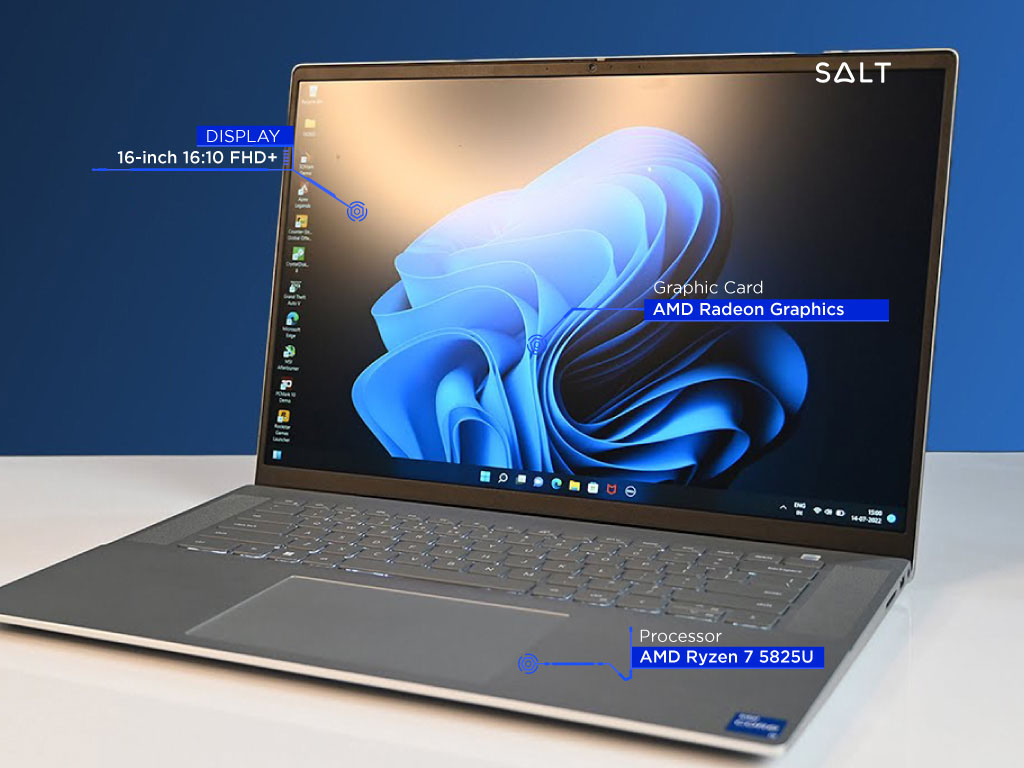
- Screen: 16" FHD+
- CPU: Ryzen 7 5825U
- Graphics: AMD Radeon
- RAM: 16GB DDR4
- Storage: 512GB SSD
- Ports: 1 x SD card reader, 2 x USB 3.2 Gen 1 Type-A, 1 x Audio jack, 1 x Power Jack, 1 x HDMI 1.4, 1 x USB 3.2 Gen 2 Type-C with PD, 1 SD-card slot
- Speaker: 2 x 2w Stereo MaxxAudio
- Weight: 4.12 pounds
As a law student, you need something that gives you reliability and efficiency. The Dell Inspiron 16 is the laptop that stands out with its superior performance and budget-friendly price.
Considering the screen, I've found it to be quite satisfactory. The 16" FHD+ display provides excellent clarity while reading case studies or drafting assignments.
Although some users have criticized the placement of the fingerprint reader, I didn't find much trouble with it after a while. However, it can be a bit hit-or-miss and might take some getting used to.
The processor of this beast is Ryzen 7 5825U paired with AMD Radeon graphics, ensuring your software runs smoothly. Trust me - when you're handling multiple tabs for research, you'll be thankful for the speedy response time!
As for storage, the generous 512GB SSD means ample room to store your case materials and e-books without worrying about running out of space anytime soon. Also sporting a RAM of 16GB DDR4 - multitasking on this machine feels like a breeze.
Now, let's talk about connectivity. It's packed with myriad ports, including an SD card reader, USB ports, an audio jack, an HDMI port, and even USB Type-C with PD! Whether it's connecting your printer or projecting your presentation on a larger screen – this laptop’s got you covered.
Interestingly enough - what truly impressed me was the Dell Inspiron 16's battery life! Hands down - it has one of the best batteries I've ever experienced on any laptop.
On the downside, however, there have been complaints about receiving refurbished units and struggling with Windows 11, but help isn't far away if you have tech-savvy friends or children!
My Verdict
My overall judgment? Considering its stellar specs and affordable price of $835 - The Dell Inspiron 16 demonstrates itself as one of the ideal choices for law students.
My personal experience with the Dell Inspiron 16 has been quite positive. It's powerful, versatile, and boasts a marathon-like battery life - definitely something to consider for your law school journey.
Pros And Cons
- High-quality display
- Powerful Processor and ample storage
- Variety of ports
- Excellent battery life
- Awkwardly placed fingerprint reader
- Complaints about refurbished units
6. ASUS Zenbook Business
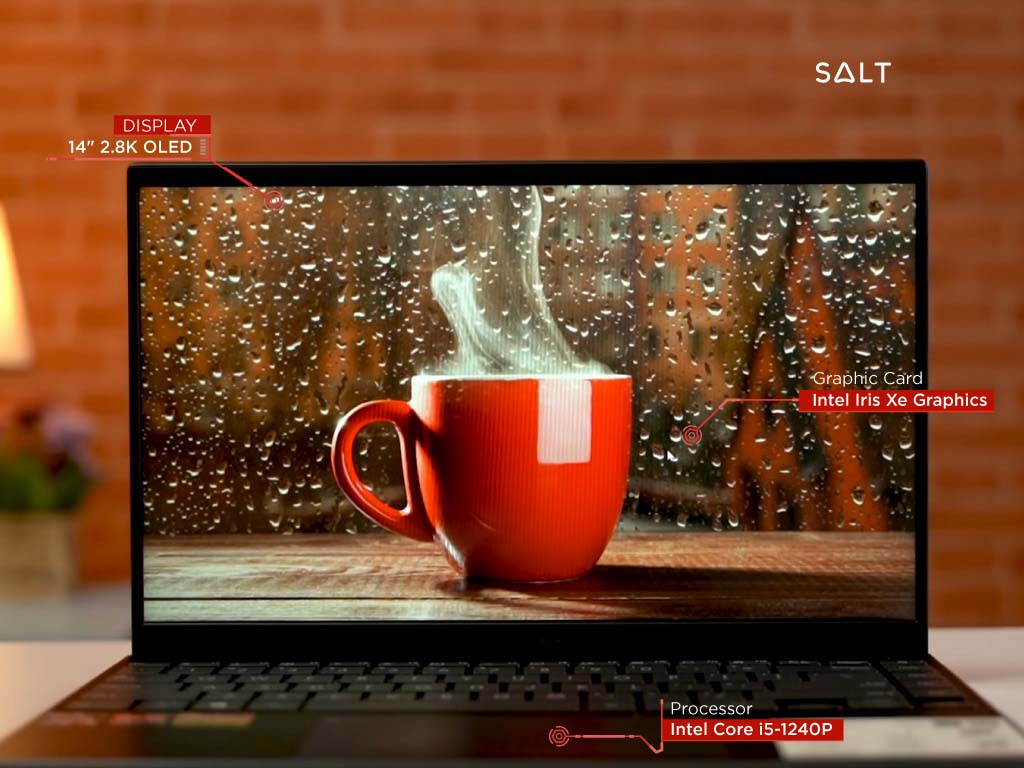
- Screen: 14" OLED
- CPU: Intel i5-1240P
- Graphics: Intel Iris Xe
- RAM: 8GB LPDDR5
- Storage: 1TB SSD
- Ports: 2 x Thunderbolt 4 USB-C ports, 1 x Audio combo jack, 1 x HDMI 2.0, 1 x USB 3.2 Gen 2 Type-A, 1 x MicroSD card reader
- Speaker: 2 x 2W Harman/Kardon
- Weight: 3.06 Pounds
My latest laptop experience involves none other than the ASUS Zenbook Business, a win-win for students seeking a balance between efficient work machines and affordable options. Priced at $799, it delivers big time in terms of high-end specs.
The Zenbook brings everything to the table with a 14" OLED screen, crisp and clear for those long hours of reading court cases or typing out legal briefs.
It's powered by an Intel i5-1240P processor that handles multitasking effortlessly. Whether you're running Westlaw or LexisNexis alongside your other writing tools, you won't face any lag whatsoever.
The adrenaline doesn't stop with the screen and processor but revs up with an Intel Iris Xe graphics unit along with 8GB LPDDR5 RAM. The laptop also offers a sizable 1TB SSD storage - basically an encyclopedia's worth of space for all your law documents.
Weighing only 3.06 pounds, this thin and light design will easily fit into most backpacks without adding stress to your existing law textbooks burden.
Moreover, the robust set of ports, including Thunderbolt outputs, are just what students need - HDMI to pull up presentations on larger screens or the Type-A USB port for connecting traditional peripherals.
As I pushed this Asus baby through its paces during my legal research work, I felt like I was gliding on cloud nine and striding confidently on terra firma at the same time.
The huge trackpad checked the right boxes, as did the nifty number pad, which elegantly disappears when not in use. However, contrary to popular belief, this model isn't touchscreen enabled.
The laptop is definitely not without its faults, though – one in particular comes up when thinking about trust issues some users had due to their experiences with defective units from the manufacturer. But interestingly, as well sadly, these issues don’t seem unique to ASUS alone.
My Verdict
In conclusion - if you're ready to put aside some apprehensions, the ASUS Zenbook Business stands as a beacon of cost-effective functionality.
It caters to all the needs of law students - ample processing power, generous storage, versatile connectivity options, and a fantastic display. So, would I recommend this laptop to fellow law students? The answer is a resounding yes.
Pros And Cons
- Light and portable design
- Powerful processor
- Large amount of storage
- High-quality display
- Not Touchscreen
- Mixed reviews about reliability post-purchase
7. LG Gram

- Screen: 14'' WUXGA
- CPU: Intel i5-1240P
- Graphics: Intel Iris Xe
- RAM: 16GB LPDDR5
- Storage: 512GB SSD
- Ports: USB 4 Gen3x2 Type C (x2, with Power Delivery, Display Port, Thunderbolt 4), USB-A 3.2 Gen 2x1, HDMI, 3.5MM
- Speaker: 2W x 2 Stereo
- Weight: 2.2 Pounds
Let's dive into a more detailed examination of the LG Gram - a laptop that is priced at $1,299 caught my attention when I was exploring options perfect for law school students. I'll guide you through all the major details to aid you in your decision.
The LG Gram is loaded with an Intel i5-1240P processor coupled with 16GB LPDDR5 RAM, making it speedy and efficient for seamless multitasking. It houses an Intel Iris Xe graphics card that makes visual content more crisp and vibrant.
I was impressed by how quickly this laptop handled resource-consuming tasks like Adobe Photoshop or Lightroom without lagging.
For individuals like me who spend several hours editing photos or typing long papers, screen quality really matters.
The LG Gram came as a pleasant surprise with its 14'' WUXGA screen that provided the detail and resolution perfect for 3:2 photo edits without having those annoying black strips on display.
The laptop comes with two 2W stereo speakers, which provide decent sound output, but what stood out more for me was its weight.
At only 2.2 lbs, it sports an aluminum and magnesium skin, making it ultra-lightweight. Convenience hits higher levels with this one when you have to carry or transport it – trust me when I say it stands in stark contrast to heavy old-school laptops.
Adding onto its unique features is the convertible aspect of this laptop, along with an included stylus that significantly eased my photo-editing sessions. It also consists of a well-lit keyboard with keys that require minimal pressure – making typing a breeze!
Though compact in design, compared to competitor models, the LG Gram is equipped with diverse ports catering to needs like ethernet connection, hard disc storage (512GB SSD), touchscreen user needs, etc. Among its ports are USB 4 Gen3x2 Type C (X2), USB-A 3.2 Gen 2x1, HDMI, and a 3.5mm jack.
Here’s what I found slightly limiting – the need for a dongle to extend ports. However, the latest-generation Wi-Fi helps in keeping one connected at all times, which is a huge plus!
While most of the negative reviews lean more towards individual experiences, such as inconsistent CPU operations, package issues, or issues with the selling party - it's not reflective of my own experience while using it.
My Verdict
After rigorous daily use, my impression of the LG gram is highly positive. It packs features to aid law students in their study hurdles while keeping the process lightweight and convenient to use.
Pros And Cons
- Lightweight and portable
- Powerful performance
- High resolution display
- Need for dongle
- Inconsistent customer experiences
8. ASUS ZenBook 14X OLED
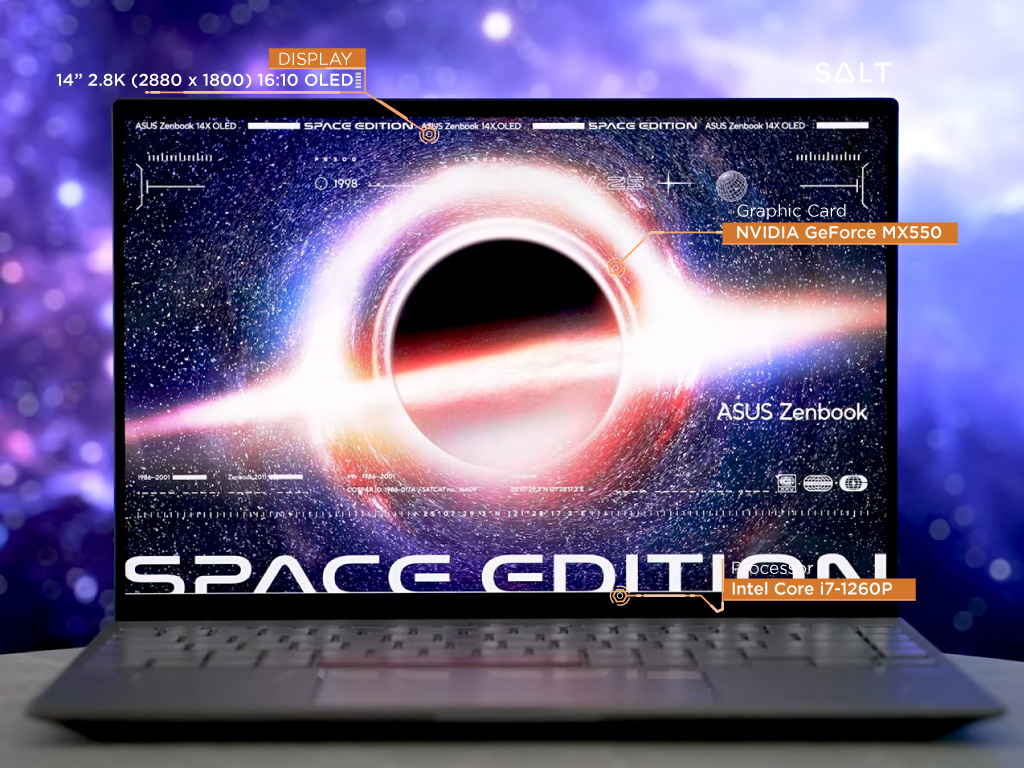
- Screen: 14” 2.8K
- CPU: Intel i7-1260P
- Graphics: NVIDIA MX550
- RAM: 16GB LPDDR5
- Storage: 512GB SSD
- Ports: 1 x USB 3.2 Gen 1 Type-A, 2 x Thunderbolt 4, Micro SD Card Reader, 1 x HDMI 2.0, 1 x Headphone & Mic Audio Jack
- Speaker: (2 x 2W) Stereo
- Weight: 3.08 pounds
When I first unpacked the ASUS ZenBook 14X, I was immediately taken in by its sleek and glossy appeal. The design, though prone to fingerprints, is definitely a show-stealer, and a simple wipe returns its original shiny glow. The packaging of this model is commendable, too.
The first thing that grabbed my attention was the impressive 14" 2.8K OLED touchscreen. The colors are vibrant, and the visuals are so crisp that it definitely elevated my binge-watching sessions to new heights.
Equipped with an Intel i7-1260P processor and 16GB LPDDR5 RAM, this laptop could smoothly operate multiple programs simultaneously without any noticeable lag.
I immediately noticed a considerable increase in speed compared to previous models; however, some may find it on par with their current laptops.
Its NVIDIA MX550 Graphics card gave an excellent picture quality, which seems especially beneficial in my class presentations when visual aesthetics mattered.
The storage provided is a 512GB SSD. I found myself wishing for something bigger, considering my vast number of e-books and case studies. Nevertheless, I upgraded mine to a 1TB model without any hassle.
In terms of physical connectivity options - well - the ZenBook 14X comes packed! It has a diverse port selection, including USB 3.2 Gen 1 Type-A, two Thunderbolt 4 ports, a Micro SD Card Reader, an HDMI port, and your standard headphone/mic audio jack.
One downside was, indeed, the battery life not matching up to expectations. As anyone else would be, I was initially excited about owning an OLED screen laptop but soon realized it cut into my battery life more than LCD screens do- giving me around only 6-7 hours on average use.
The controversial ScreenPad may take some getting used to as well. It's essentially a 5.65-inch interactive touchscreen trackpad; while it sounds fancy, I found it to be more frustrating than innovative and ended up using it as a traditional trackpad.
Weighing just over 3 pounds, this laptop is rather convenient to carry around campus or slip into my backpack for trips to the library.
My Verdict
If you're hungry for advanced specs and willing to sacrifice a bit on battery life, settling for minor hiccups like the fingerprint magnet exterior, then the Asus ZenBook 14X might be your go-to choice in 2023.
Pros And Cons
- Vibrant OLED Screen
- Swift Performance
- Robust Connectivity Options
- Mediocre Battery Life
- Smudge-prone Exterior
9. Acer Aspire 5

- Screen: 17.3" FHD
- CPU: Intel i5-1135G7
- Graphics: Intel Iris Xe
- RAM: 8GB DDR4
- Storage: 512 GB SSD
- Ports: 1 x USB-C 3.2, 2 x USB-A 2.0, 1 x HDMI with HDCP support, 1 x Ethernet RJ-45, 1 x Mic-In/Headphone-Out, 1 x DVD-RW
- Speaker: 2 x 4W Stereo
- Weight: 4.72 pounds
The Acer Aspire 5, priced at $699, is a mid-range gem and one of the most feasible options for law students.
This model runs on the Intel i5-1135G7 CPU combined with the Intel Iris Xe Graphics. The 17.3" HD screen and immersive sound system with dual speakers provide an impressive experience.
I appreciated its display features – from its full HD screen to pretty accurate color representation.
I found that it's large enough for multiple tasks at once, enhancing productivity significantly. Don't expect MacBook quality on this one—but the brightness and crispness are certainly up to par.
The plastic build may not be as hefty or refined as more expensive alternatives, but it needs to be understood that this machine is solid and robust.
The aluminum top gives it a classy look while maintaining durability—the fingerprint scanner is an added advantage!
One minor setback is the lack of a USB-C charging port; however, Aspire compensates for this by offering several other ports, including a USB-C 3.2 port, two traditional USB type A ports, HDMI with HDCP support—not to mention an Ethernet gateway for high-speed connections.
Performance-wise, I was thrilled when coupling the 11th gen Core i5 processor with a RAM upgrade to 16GB – it simply breezes through multiple heavy tasks simultaneously.
Though Acer does embed a permanent 4GB soldered RAM on this model, which could have been avoided.
However, in rare instances, should you face any issues with monitor responsiveness after prolonged usage. A temporary fix could be restarting or shutting down your laptop before resuming work again.
My Verdict
Given all these details, my verdict is that despite its minor setbacks here and there - Acer Aspire manages to appeal due to its power-packed specifications combined with affordability!
Pros And Cons
- Robust Performance
- Plethora of Ports
- Affordable Price Range
- No USB-C charging
- Occasional Monitor issues
10. Microsoft Surface Pro 9

- Screen: 13” PixelSense
- CPU: Intel i5-1235U
- Graphics: Intel Iris Xe
- RAM: 16GB LPDDR4x
- Storage: 512 GB SSD
- Ports: 2 x USB-C with USB 4.0/ Thunderbolt 4, 1 x Surface Connect port, 1 x Surface Type Cover port
- Speaker: 2 x 2W Dolby Atmos
- Weight: 3.3 pounds
In the world of hybrid laptops, the Microsoft Surface Pro 9 has definitely made its mark, especially considering its price of just $949.
This sleek and portable laptop offers a 13” PixelSense screen, which quite literally puts more pixels on the screen than your eyes can see, making it incredibly clear and ideal for reading case studies or writing legal papers.
The graphics are powered by Intel Iris Xe, which ensures an immersive viewing experience whether you're scrolling through documents or catching up on your favorite Netflix series.
Under the hood, it has an Intel i5-1235U CPU gear up this device to deal with any task smoothly without slowing down.
Thanks to its impressive 16GB LPDDR4x RAM and the ample storage space of a 512 GB SSD, multiple applications run seamlessly in my experience.
Its ports include 2 USB-C ports compatible with Thunderbolt 4 for quick file transfers, coupled with the Surface Connect port and Surface Type Cover port for a seamless confluence of efficiency and connectivity.
The cherry on top is certainly its high-end speakers – two 2W Dolby Atmos ones – that add an audial charm to your movie nights or video calls with family. Despite packing so much power within a small frame, this laptop weighs just 3.3 pounds!
From my personal experience doing research papers or going through lengthy PDF files, I have found that the Microsoft Surface Pro 9 is a truly remarkable device.
As perfect as this laptop looks on paper (and often in real life), some users have had issues with battery life retention over heavy usage periods over time (although my own experience is rather positive in this regard.)
My Verdict
My verdict is straightforward: If you're someone who values convenience and multitasking while on the go, you won't go wrong with the Microsoft Surface Pro 9.
It handles rigorous law school tasks with ease and is a great investment for students who need both a high-performance laptop and a tablet. Even though the battery life might give you some worries, trust me, all its other traits outshine this minor hiccup.
Should you buy it? As a Surface Pro 9 user myself, despite minor flaws that plague every tech product out there, I'd say absolutely yes! It's your perfect comrade in the intellectual battleground known as law school.
Pros And Cons
- Stunning PixelSense display
- Great battery life
- Robust performance overall
- Limited port options
- Some users reported poor battery life
Buying Guide: Best Laptops for Law School Students
CPU
The CPU is the most important factor to consider when choosing a laptop for law school. After all, this is the brain of the computer and will be doing most of the heavy lifting. When it comes to CPUs, You should choose at least an Intel and AMD.
These are the latest and fastest processors on the market and will be more than enough for law school use. Both offer great performance.
GPU
The GPU is another important factor to consider. This is the part of the computer that handles graphics processing.
For law school students, you'll need a laptop with a good GPU if you plan on doing any research or writing papers that require the use of visuals. We recommend choosing a laptop with at least an NVIDIA GTX or RTX and AMD Radeon or Ryzen Series GPU.
RAM
RAM is another important factor to consider when choosing a laptop for law school. The more RAM you have, the faster your computer will be able to access and use that data. It can handle demanding tasks such as video editing and gaming.
We recommend choosing a laptop with at least 8GB of RAM. Or you can go with 16GB if you think you'll need the extra speed.
Storage
Another crucial factor to consider is storage. This is where all of your files and data will be stored. So you'll need to choose a laptop with enough storage to meet your needs.
If you plan on storing a lot of data, we recommend choosing a laptop with at least 256GB of storage. But if you think you need more, you can always opt for a 512GB or even a 1TB drive.
Display
The display is another factor to consider when choosing a laptop for law school. After all, you'll be spending a lot of time looking at it. A higher resolution display gives you more screen real estate and lets you see more information at a glance.
We recommend choosing a laptop with at least a 1080p display. But if you can afford it, go for a 1440p or even a UHD display.
Ports
Ports are another important factor to consider. This is because you'll need to connect your laptop to other devices, such as printers, scanners, and external hard drives. Make sure the laptop you choose has the ports you need.
The most common type of port is USB, so make sure the laptop has at least a few USB ports. We recommend choosing a laptop with at least a USB-A port, one USB-C port, an HDMI port, and a microSD card reader.
Connectivity
Connectivity is another factor to consider. This is because you'll need to connect your laptop to the internet. Wi-Fi is the most common type of connectivity, so make sure the computer has Wi-Fi built-in.
Bluetooth is also a nice feature to have if you want to connect wireless peripherals such as a mouse or keyboard.
Battery Life
The battery life is also essential. You'll need to consider battery life. This is because you'll likely be using your laptop for long periods. We recommend choosing a laptop with at least six hours of battery life. But if you can afford it, go for a computer with eight or even nine hours of battery life.
Portability
The last factor to consider is portability. This is because you'll need to be able to carry your laptop with you to and from class. We recommend choosing a laptop that weighs no more than four to eight pounds. And if you can afford it, go for a computer with a thin and light design.
Price
The price is one of the important factors to consider when choosing a laptop for law school, ensuring that you get the best possible deal. It is important to find a computer that has all of the features you need without breaking the bank.
Conclusion
So, there you have it! These are the laptops we think are best for law school students. They’re all great machines that will help you get through your studies. All of the laptops we've discussed have their own unique set of features that make them ideal for different people.
Ultimately, the best laptop for you is the one that meets your specific needs and budget. We hope this guide has helped you narrow down your search and find the perfect laptop for law school.

Markus Braasch
After growing up in Germany I decided to take a brief break from entrepreneurship to study in the US. This led to meeting my beautiful wife and starting our life together in South Carolina. Written content has transformed my life. I enjoy sharing this passion with others. Please connect with me on social and let me know your thoughts on this article so my next one can be better.










